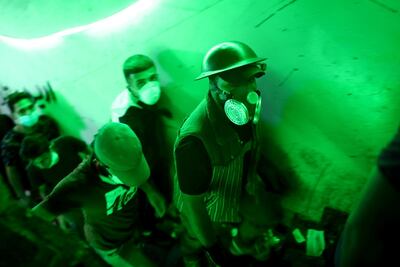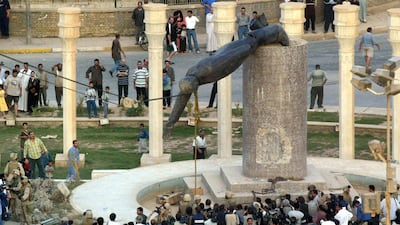With the passing of time, seminal events are often reduced to a series of images. The shocking 1972 photograph of Kim Phuc, the 9-year-old girl burnt in an American napalm attack, encapsulates the Vietnam War. Pictures of Germans celebrating on top of the Berlin Wall are often used as shorthand for the collapse of communism.
The abiding image of the 2003 US-led invasion of Iraq is that of hundreds of Iraqis pulling down a 12-metre statue of Saddam Hussein in Baghdad’s Firdos Square. More photos would emerge to become mental snapshots of the chaotic time that followed, such as that of a hooded Iraqi detainee, Ali Shallal Al Qaisi, being forced to pose on a box by US torturers at Abu Ghraib prison, or stills from a rooftop interview with information minister Muhammad Al Sahhaf, denying the invasion was happening even as the Saddam regime crumbled around him.
This week, a different image of Iraq was on show. During the Sulaimani Forum, an international gathering of academics, policymakers, journalists and campaigners at the American University in Iraq – Sulaimani, a panel of young Iraqis debated the urgent need for deep political reform.
Iraq is a country where 60 per cent of the population is under 25. This is a whole generation that has grown up with little or no direct memories of the 2003 invasion, but they have all been forced to live with its consequences. Soon, it will be this postwar generation that will run the country and deal with its challenges.

Sadly, this list of challenges is long and daunting: ISIS terrorism; a chronic lack of electricity (despite Iraq being a significant energy producer); corruption; poor infrastructure and health care; the ravages of climate change; powerful militias; an ailing economy and the ills of nepotism.
The desire for change among young people has been clear for years. Frustration among young Iraqis whose lives have been curtailed by these problems, as well as a sclerotic political system, boiled over in the 2019 protests. These provided another defining image of post-invasion Iraq – that of thousands of young people, many draped in the national flag, at the heart of Tahrir Square in Baghdad.
Despite Iraq’s chronic turmoil, two decades on from the invasion, it remains a unified state with a peaceful transfer of power and refers to the US as a partner, rather than an occupier. The country works with regional friends such as the UAE to restore damaged heritage, like Al Nuri Mosque and Al Saa'a and Al Tahera churches in Mosul.
Iraq’s politicians are at least trying to wrestle with the monster of corruption, this month summoning ministers for questioning over the allocation of funds for a major project in Nineveh. A major investigation is under way to recover the theft of $2.5 billion in public funds.
Also this week, Iraq’s Cabinet approved a $152-billion budget bill that will be scrutinised by an elected parliament.
Geopolitically, Iraq is shaking off the chaos of the invasion years and the heavy legacy of Saddam Hussein’s dictatorship. The Baghdad Conference for Co-operation and Partnership, that began a few years ago, has hosted high-level regional diplomacy that also offers the opportunity for engagement to Iran. Iraq, in time, could become an important partner as Riyadh and Tehran explore opportunities following their recent restoration of diplomatic ties.
However, looking at where Iraq stands now requires some determined optimism. The invasion removed a despotic regime, but it also led to years of conflict in which the Iraqi people bore the brunt of the suffering. The country’s wounds are far from healed and there are significant problems to tackle now and in the years ahead.
But it is a country with arable lands, and natural and human resources. Its youthful population is a source of hope, energy and dynamism. With some political will, it may be possible to deliver them a country that can meet their desire for jobs, education and stability. If Iraq can achieve this, it could become a regional powerhouse working for opportunity at home and stability abroad.


